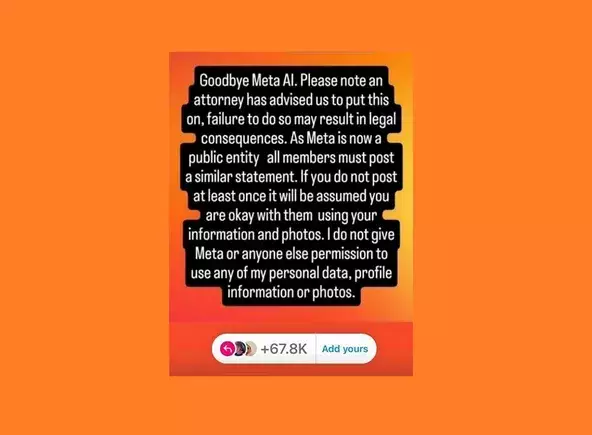Social media is an incredible platform that allows for the rapid sharing of information, opinions, and updates. However, it can also perpetuate misinformation and misunderstandings regarding legal matters. The recent trends of users sharing messages that claim to protect their online content may seem harmless but are more indicative of a broader issue: the lack of genuine understanding of how digital rights and legal frameworks operate in our tech-driven society.
The Empty Weight of Social Media Declarations
Over recent months, particularly after significant announcements by platforms like Meta, users have taken to social media to disseminate hoax legal disclaimers. These declarations, often shared by well-known personalities, suggest that posting a specific statement can somehow shield their content from being used by the platform’s algorithms or AI systems. However, such actions are fundamentally ineffective and operate under the misconception that social media offers any legal recourse simply through a post or shared story.
In essence, these messages unequivocally amount to nothing. They are equivalent to frivolous actions that lack any legal grounding — a digital-era equivalent to yelling something in a crowded room and expecting it to carry weight in a court of law. The very premise rests on a misguided belief that social shares can initiate a legal declaration, which they cannot.
At the heart of this issue is a basic disregard for reading and understanding terms of service agreements. Most users click “I agree” without comprehending the implications of their consent, effectively permitting platforms to use their posts in various capacities, including for AI training. Meta has articulated clear guidelines around this topic, specifying that while private messages remain confidential, public posts can and will be leveraged in AI development.
This is an important point that users often overlook. By participating in these platforms and sharing content publicly, users are already consenting to the use of their data. A social media post stating otherwise does not alter the reality of these agreements.
One of the notable dangers of spreading inaccurate information about legal issues on social media is the potential to mislead individuals who may be less informed. Not only does this breed confusion regarding personal digital rights, but it can also mark individuals as susceptible to manipulation, making them potential targets for scams. Scammers thrive on misinformation, and promoting invalid legal defenses certainly plays into their hands.
Additionally, this type of engagement theater distracts from the more profound issues at play. Users are encouraged to focus on sensationalized statements rather than understanding the nuances of digital rights or advocating for policy changes within their jurisdictions.
So what can individuals do instead of indulging in the misinformation spreading through their feeds? The answer lies in education. Rather than engaging with misleading statements, viewers should invest time in reading about their legal rights, intellectual property laws, and the intricacies of social media terms of service agreements.
For individuals residing in the EU, the “Right to Object” serves as a formal option to opt out of certain data uses, but this varies widely around the globe. Knowing the landscape of digital rights empowers users, clearing up the fog created by quick social media exchanges.
Moreover, fostering critical consumption of social media content can lead to more informed communities. It is imperative to support political candidates and organizations that prioritize transparency and push for legislation that protects users’ digital information more robustly.
The world of social media is a double-edged sword that can both inform and mislead. Users must take the initiative to educate themselves about digital rights and the function of social media platforms, rather than relying on fleeting posts that offer no real protection or recourse. As we continue to engage in this digital age, it is vital to promote understanding over engagement, recognizing that true empowerment comes from informed awareness rather than mere social sharing.


Leave a Reply